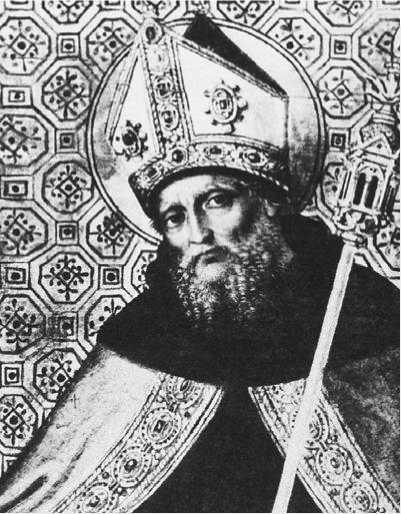Excerpt from the Confessions
Published in Confessions and Enchiridion, 1955
"I was not in love as yet, but I was in love with love; and, from a hidden hunger, I hated myself for not feeling more intensely a sense of hunger. I was looking for something to love, for I was in love with loving."
Perhaps no figure in medieval Christianity was as admired and influential as Augustine (aw-GUS-tin; 354-430). Yet he was a man not only of the Middle Ages, but also of ancient times: he grew up in a world still dominated by the Western Roman Empire, but lived to see the beginning of its end. In this confused, changing environment, Augustine's writings presented an all-embracing view of Christian faith as the one solid rock in a sea of uncertainty.
Augustine grew up in North Africa, which was then part of the Roman Empire, and studied in Carthage. The latter city, located in what is now Tunisia, was a great center of learning—but it was also, as he made clear in his Confessions, a place where a young man could get into a great deal of mischief. While there, Augustine became involved in a number of sexual relationships, one of which resulted in the birth of a son; spent time with a gang of troublemakers called the "wreckers"; and flirted with a faith called Manichaeism (man-uh-KEE-izm), which the Church later declared a heresy (HAIR-uh-see), or a belief that goes against established teachings. But it was also in Carthage that Augustine was first set


Augustine. Reproduced by permission of the Library of Congress.
Augustine
One of the most significant figures in the early history of the Church, Augustine or Aurelius Augustinus—who became recognized as St. Augustine after his death—helped bridge the period from ancient to medieval times. He grew up in a world heavily influenced by the Roman Empire, but the power of Rome had begun to fade in his time, and Augustine promoted Christian faith as a more stable foundation than any earthly kingdom.
Augustine was born in Tagaste (tuh-GAS-tee) in North Africa, and grew up studying traditional Roman subjects such as rhetoric (RET-ur-ik), or the art of speaking and writing. At home, his parents were divided on the subject of his religion: his father, Patricius, worshiped the old Roman gods, whereas his mother, Monica (later St. Monica) was a devout Christian. As Augustine later recalled in the Confessions, Monica prayed for him often during his wayward youth.
In his teens, he went away to school in Carthage, the greatest center of learning in the area. There he became involved with a woman, and fathered a son out of wedlock. He also flirted with Manichaeism (man-uh-KEE-izm), a religion against which he would argue passionately after he became a Christian. After his schooling in Carthage, Augustine became a teacher in that city and Tagaste, but he was frustrated with discipline problems in the schools, so he decided to move to Rome.
Augustine arrived in Rome in 383, at the age of twenty-nine, and later moved to the north Italian town of Milan (mee-LAHN). There Monica joined him following the death of Patricius, who apparently converted to Christianity on his deathbed. Also in Milan, he came under the influence of Ambrose (St. Ambrose; 339-397), another important figure in the early Church. In July 386, Augustine converted to Christianity, and was baptized the following Easter.
Monica's happiness over her son's conversion was short-lived: as they were preparing to return to Tagaste in 391, she fell ill and died. So Augustine went back alone, to become first a priest and then, in 396, a bishop. In this capacity he acted as spiritual leader over the Christians at Hippo, a city in what is now Algeria, for the rest of his life.
On the path that led to his acceptance of Christianity more than ten years later.
Augustine went on to become one of the greatest defenders of the Christian faith, and after his death he was honored as a saint and early father of the Church. Yet in his Confessions, he laid bare his soul, showing the depths of his inner confusion and the many wrong things he had done in his youth. The book is addressed to God, and is one of the most deeply personal works ever written. In fact, it could be properly called the first real autobiography, or personal history, because it is not nearly as concerned with outside events as it is with the inner life of Augustine himself.




 World History
World History









